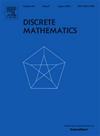卡勒多项式
IF 0.7
3区 数学
Q2 MATHEMATICS
引用次数: 0
摘要
欧拉多项式根据降序的数量枚举排列。我们开始研究 Cayley 排列的降序多项式,我们称之为 Caylerian 多项式。通过将 Caylerian 多项式与 Burge 词和 Burge 矩阵联系起来,一些经典结果得到了推广。两边欧拉多项式的γ非负性用伯格结构重新表述。最后,证明了具有规定上升集的 Cayley 置换可以用具有固定行和的 Burge 矩阵来计算。本文章由计算机程序翻译,如有差异,请以英文原文为准。
Caylerian polynomials
The Eulerian polynomials enumerate permutations according to their number of descents. We initiate the study of descent polynomials over Cayley permutations, which we call Caylerian polynomials. Some classical results are generalized by linking Caylerian polynomials to Burge words and Burge matrices. The γ-nonnegativity of the two-sided Eulerian polynomials is reformulated in terms of Burge structures. Finally, Cayley permutations with a prescribed ascent set are shown to be counted by Burge matrices with fixed row sums.
求助全文
通过发布文献求助,成功后即可免费获取论文全文。
去求助
来源期刊

Discrete Mathematics
数学-数学
CiteScore
1.50
自引率
12.50%
发文量
424
审稿时长
6 months
期刊介绍:
Discrete Mathematics provides a common forum for significant research in many areas of discrete mathematics and combinatorics. Among the fields covered by Discrete Mathematics are graph and hypergraph theory, enumeration, coding theory, block designs, the combinatorics of partially ordered sets, extremal set theory, matroid theory, algebraic combinatorics, discrete geometry, matrices, and discrete probability theory.
Items in the journal include research articles (Contributions or Notes, depending on length) and survey/expository articles (Perspectives). Efforts are made to process the submission of Notes (short articles) quickly. The Perspectives section features expository articles accessible to a broad audience that cast new light or present unifying points of view on well-known or insufficiently-known topics.
 求助内容:
求助内容: 应助结果提醒方式:
应助结果提醒方式:


